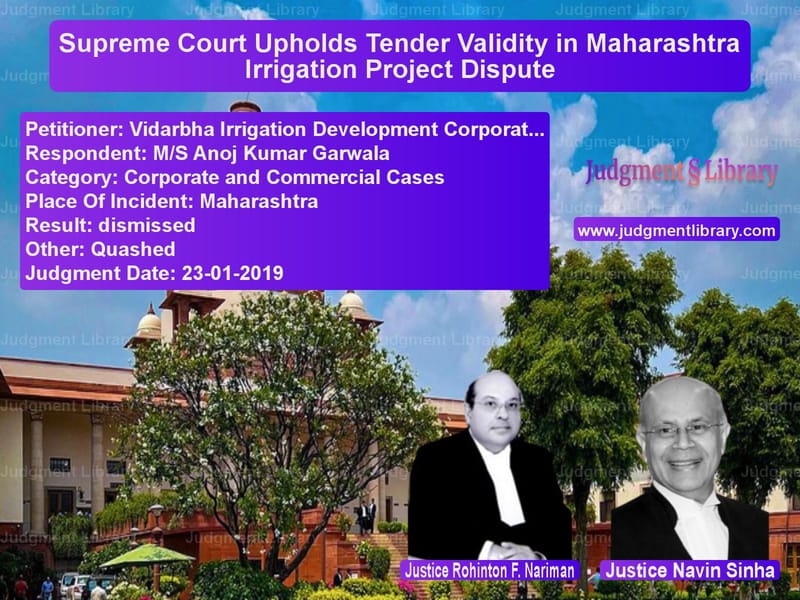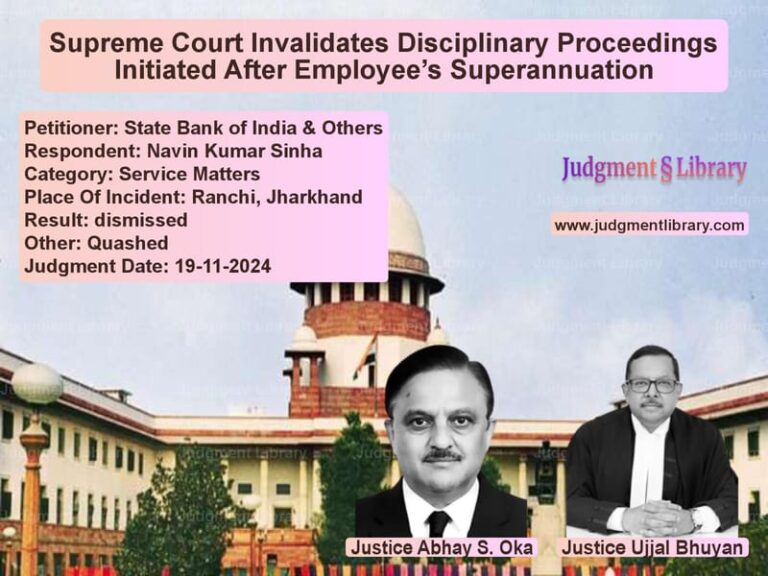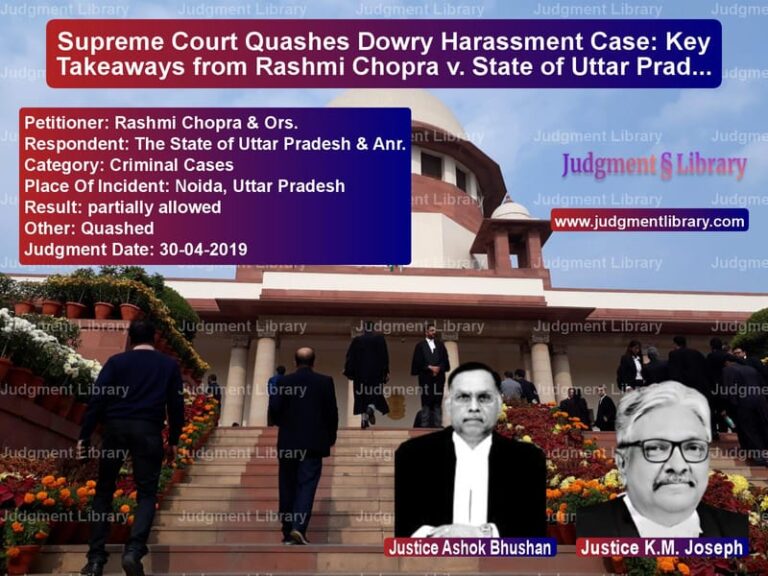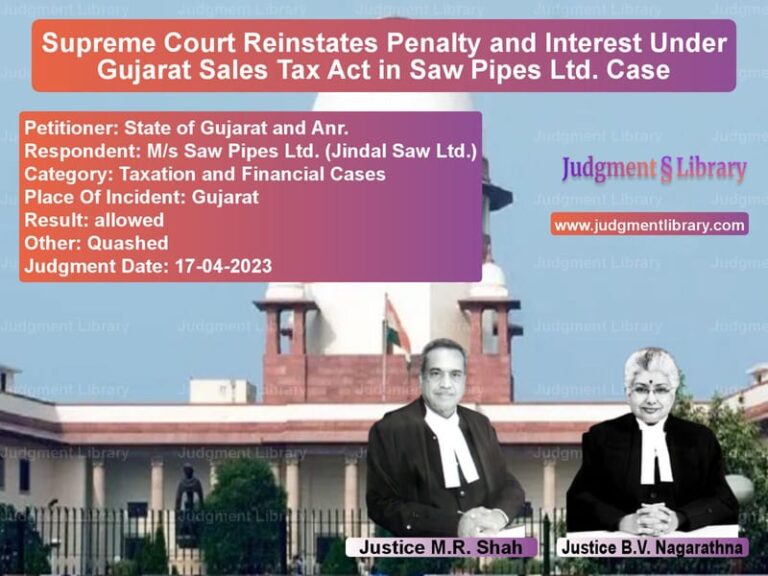Supreme Court Upholds Tender Validity in Maharashtra Irrigation Project Dispute
The Supreme Court of India recently delivered a significant judgment in Vidarbha Irrigation Development Corporation vs. M/S Anoj Kumar Garwala. The case revolved around a tender dispute concerning a major irrigation project in Maharashtra, with the core issue being whether a bank guarantee’s validity period constituted a material deviation that would render a bid non-responsive.
The Court’s ruling reinforced the importance of strict adherence to tender conditions, especially concerning financial securities like performance guarantees, and emphasized that even minor deviations in tender requirements cannot be condoned.
Background of the Case
In January 2018, the Vidarbha Irrigation Development Corporation (VIDC) issued a tender for balance earthwork in a canal project. The bids were submitted by three contractors:
- Respondent No. 1: Rs. 39.53 crores
- Respondent No. 2: Rs. 39.15 crores
- Respondent No. 3: Rs. 46.81 crores
Respondent No. 2, being the lowest bidder, was initially awarded the contract. However, an objection was raised regarding its submitted bank guarantee, which was valid for only six months instead of the required 40 months. Subsequently, Respondent No. 2 extended the guarantee to meet the requirement, after which its bid was accepted.
Respondent No. 1 challenged the decision, arguing that the bank guarantee’s initial deficiency was a material deviation that should have resulted in outright rejection. The Bombay High Court ruled in favor of Respondent No. 1, holding that the tender conditions must be strictly followed.
VIDC and Respondent No. 2 appealed the High Court’s decision before the Supreme Court.
Key Legal Issues
- Whether the submission of a bank guarantee with an insufficient validity period constituted a material deviation under the tender conditions.
- Whether a bidder could rectify deficiencies after bid submission.
- The extent of discretion available to tendering authorities in relaxing conditions for bidders.
- The legal consequences of modifying an essential requirement post-submission.
Petitioners’ Arguments (VIDC and Respondent No. 2)
- The tender allowed certain post-submission clarifications, and the extension of the bank guarantee was done immediately after the issue was raised.
- Strict compliance with the bank guarantee term was not required, as long as it was rectified before final bid approval.
- The decision to accept the rectified guarantee was taken in good faith to ensure the lowest bid prevailed, resulting in public savings of approximately Rs. 37 lakhs.
Respondents’ Arguments (Respondent No. 1)
- The tender conditions were explicit and clearly required a 40-month validity for the bank guarantee at the time of submission.
- Any deviation from the specified validity period was a material breach that rendered the bid non-responsive.
- The High Court correctly ruled that a non-compliant bid should be outright rejected instead of allowing post-submission modifications.
Supreme Court’s Observations
The Supreme Court, comprising Justice Rohinton F. Nariman and Justice Navin Sinha, ruled in favor of Respondent No. 1, affirming that the requirement for a 40-month validity period was an essential condition of the tender.
The Court emphasized:
- “All tenderers are cautioned that tenders containing any deviation from the contractual terms and conditions, specifications, or other requirements shall be rejected as non-responsive.”
- “The submission of a bank guarantee with an insufficient validity period fundamentally altered the risk profile of the bid.”
- “A bid cannot be subsequently made responsive by correction, as it would amount to unfair competition.”
Final Verdict
The Supreme Court ruled:
- The contract awarded to Respondent No. 2 was invalid, as its bid was non-responsive at the time of submission.
- Respondent No. 1 was entitled to execute the contract at the same price as Respondent No. 2.
- The High Court’s ruling was upheld, reinforcing that essential tender conditions cannot be relaxed post-submission.
Legal and Practical Implications
- The judgment reinforces the principle of strict compliance in government procurement.
- It prevents favoritism and post-submission modifications that may create unfair advantages.
- Government authorities must ensure transparent tendering processes to maintain public trust.
- The ruling sets a precedent for ensuring fair and equal treatment of all bidders.
This case establishes a crucial precedent for public procurement, ensuring that bid conditions are adhered to rigorously, promoting transparency and fairness.
Petitioner Name: Vidarbha Irrigation Development Corporation.Respondent Name: M/S Anoj Kumar Garwala.Judgment By: Justice Rohinton F. Nariman, Justice Navin Sinha.Place Of Incident: Maharashtra.Judgment Date: 23-01-2019.
Don’t miss out on the full details! Download the complete judgment in PDF format below and gain valuable insights instantly!
Download Judgment: Vidarbha Irrigation vs MS Anoj Kumar Garwa Supreme Court of India Judgment Dated 23-01-2019.pdf
Direct Downlaod Judgment: Direct downlaod this Judgment
See all petitions in Contract Disputes
See all petitions in Corporate Compliance
See all petitions in unfair trade practices
See all petitions in Judgment by Rohinton Fali Nariman
See all petitions in Judgment by Navin Sinha
See all petitions in dismissed
See all petitions in Quashed
See all petitions in supreme court of India judgments January 2019
See all petitions in 2019 judgments
See all posts in Corporate and Commercial Cases Category
See all allowed petitions in Corporate and Commercial Cases Category
See all Dismissed petitions in Corporate and Commercial Cases Category
See all partially allowed petitions in Corporate and Commercial Cases Category







